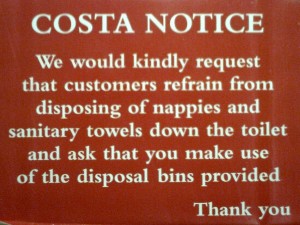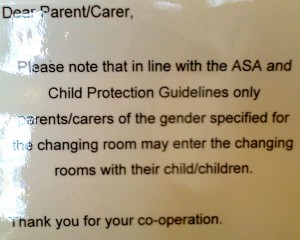Plain English Patrol 1
Life is tough for the delicate copywriter. Bad English is everywhere, just waiting to leap out and chafe your sensibilities. And the heartbreaking thing is that just a little thought and effort would have made the difference between total calamity and total clarity.
In posts under the banner of ‘Plain English Patrol’, a name I’m quietly pleased with, I’ll be looking at everyday examples of obscure, wordy and unclear writing and seeing if I can improve them. (Well, obviously I’ll improve them – I’d hardly include them if I couldn’t.) Let the games begin…
Verbal diarrhoea
First up is Costa Coffee. I’ve had a pop at Starbucks before, so it’s only fair their rival should take one in the shorts. I was last there trying my very first Flat White, which I was quite excited about until I discovered it was exactly the same as a Latté. So now I will have my revenge – through a smartass blog post about their signage that no-one from the company will ever read.
The notice below appears in the loo of the London Street branch in Norwich.
COSTA NOTICE
We would kindly request that customers refrain from disposing of nappies and sanitary towels down the toilet and ask that you make use of the disposal bins provided
Thank you
That’s you told! The curiously branded ‘Costa notice’ certainly strikes the right snappy, vinegary tone. The total lack of punctuation gives an icily brittle, peremptory feel, while ‘we would kindly request’ and ‘bins provided’ add a bitter twist of passive aggression and pursed-lips butter-wouldn’t-melt etiquettery.
The problem is that the spindly, overlong sentence and wilfully obscure language (‘refrain’, ‘disposal’) are highly unlikely to reach the target audience. I think it’s a safe assumption that people who stuff nappies down public loos (would they do that at home?) probably don’t read notices – not even red ones. We’re on a hiding to nothing here, but we can at least give ourselves the best possible chance of getting through:
NO NAPPIES OR TOWELS DOWN THE TOILET
Please don’t put rubbish down the toilet. Use the bin instead.
Thank you.
That’s more direct, more conversational and I think more likely to work. And at 20 words to the original’s 32, the audience might even reach the end of it.
What’s more, Costa could use a smaller notice, saving themselves untold thousands on ink, paper and glue across their gazillion branches. What a wonderful example of the good that copywriting can do in the world.
That one’s on the house, Costa – just be sure to inbox me next time you’re revising your tone of voice guidelines.
Foot shoot
Flushed with success, let’s move on to Fruit Shoot, the insanely chemical drink that’s like catnip to kids. (My estimation of a leisure venue always rises if they’ve opted to stock the smaller bottles.)
Unfortunately my camera phone wasn’t up to capturing this one, so you’ll have to trust my transcription. It’s the small print about a competition that’s promoted on the bottle.
Open to those aged 12 and under. Parent/Guardian consent is required for participation…
So let me get this straight. By definition, we’re talking to kids – if the parent or guardian is already reading, there isn’t a problem. And we’re talking to kids as young as five or six. So why, in the name of all that’s holy, are we using words like ‘consent’, ‘required’ and ‘participation’?
The Flesch-Kincaid reading level of this text is 9.0, or US ninth grade – in other words, only likely to be comprehensible to children of at least 14. Clearly, whoever wrote this didn’t spend too long thinking about the nature and concerns of their audience.
It’s puzzling because the understandable version is so obvious:
You must be 12 or younger to enter. Ask your Mum or Dad first.
OK, I’ve lost the ‘guardian’, but I’m sure kids with guardians will get the message. And with a grade level of 1.4 (clear to a six-year-old) I feel the trade-off is totally worth it.
Deep water
Finally, here’s a notice from the pool where my daughter has her regular swimming class.
Dear Parent/Carer,
Please note that in line with the ASA and Child Protection Guidelines only parents/carers of the gender specified for the changing room may enter the changing rooms with their child/children.
Thank you for your co-operation.
Now, we’re talking about protecting children here, not just toilets, so it’s important that the language is precise and authoritative. But at the same time, it needs to be understood by people from every educational background. And with a reading age of 15+ for this text, that’s by no means guaranteed. (It’s not uncommon for organisations seeking universal readability to aim for an age of 12 or so – but the lower the better, obviously.)
It actually took me a while to tease out the underlying meaning. As far as I can tell, it can be boiled down to:
Women only in the girls’ changing room.
Men only in the boys’ changing room.
Yes, that’s right – if I’m taking her, my poor daughter has to get changed with the boys, with their incessant shouting and infuriating unwillingness to lift up the loo seat. (Again, would they do that at home?)
I can see my version might have been rejected – it feels clumsy and duplicative having to write two parallel sentences when you can convey the same meaning in one. But when such economy means you have to resort to phrases like ‘gender specified’, I think you’ve thrown the baby out with the bathwater. Better to be clunky and clear than elegant and elusive – and I’ve got the reading age down to eight, so I think that’s mission accomplished. All in a day’s work for the Plain English Patrol!
Comments (17)
Comments are closed.


Great post Tom – looking forward to seeing more!
Incidentally, have you walked past a Fones-4-U store lately? If you do, take a look at the window display for the newest Blackberry handset. They have managed to spell “thinnest” as “thinest” handset.
I was in hysterics when I first saw it – how could a large corporate company like Fones-4-U make a spelling mistake like that?
@Gary
Thanks for the kind words.
The bigger the text, the harder it is to spot the mistake…
The last one for me is clearly the worst but I think that isn’t just because it’s badly written. It’s interesting that you had trouble teasing out the meaning and that the result is a statement of the bleeding-obvious (sorry, I’m aware that’s just a trifle insulting).
I suspect the primary purpose of this last notice isn’t to inform anyone of anything: it’s to put a tick in a box and cover their backsides in case somebody does something stupid. If a man is found wandering through the girls’ changing room and someone complains, the authorities can point at the notice and say they had taken all reasonable steps etc etc.
Informing people that the adults should only use the correct changing rooms is not what the notice is there for and because the real meaning of the notice is hidden trying to put it into sensible English is difficult.
#end rant#
Nice article btw!
@Gordon
Thanks for the kind words.
I share your sentiments about the last notice, but I’ve confined myself to the writing aspects of it. If we’re going to explore the wider implications, I would point out that the notice ignores the possibility of men looking at boys (or indeed women looking at girls), so the backside-covering is even more disingenuous than you point out.
Hi Tom – Yes, fair point. Just had a poke around the rest of your website (got here via twitter) and really enjoyed it, particularly the contact and home pages.
I think the original notice may have been intending to convey that one changing room is for males only and one changing room is for females only. So, a father cannot go into any changing room with his daughter and a mother cannot go into any changing room with her son. It certainly creates quite a problem for parents and carers.
If Costa is making flat whites that are indistinguishable from lattes, they’re doing it wrong. As a Kiwi, I can tell you that a flat white should be stronger than a latte and served in a smaller cup (unfortunately I’m not a barista so can’t go into an explanation of coffee:milk ratios, but I’m certain they’re different).
To the point: I like this game, and intend to start playing it. I already spend most of my life on Punctuation Patrol, so this could be a fun new, if somewhat agitating, game.
@Rebecca
You may well be right. If so, my observations would be (a) nearly everyone ignores the rule, perhaps because they don’t understand it, and (b) if hyper-intelligent professional writers don’t all see the same meaning, what hope for the rest of humanity?
@Lucy
You’re forgetting the overriding factor: my own unsophisticated taste. The fact I can’t tell the difference doesn’t mean there is no difference. See also my undiscerning consumption of red wine, which in my mind I divide into two types: ‘a bit fruity’ and ‘a bit woody’.
Tom, have a go at this one, displayed at the entrance to Canary Wharf station when it’s raining:
DUE TO ADVERSE WEATHER CONDITIONS FLOOR SURFACES MAY BECOME SLIPPERY WHEN WET.
That’s so very wrong in so many places, but at least they didn’t go for the infantile ‘slippy’.
Tom, thanks for your Plain English Patrol missive. You made me laugh.
Of course councils and small business aren’t alone in their abuse of the English language. Government departments and many large companies churn out reams of passive voice, gobbledygook.
I hope for your sanity sake your Plain English Patrol never stumbles across such gobbledygook.
@Kevin
Due to adverse intellectual conditions, semantic structures may become convoluted when writ.
@Paul
Sad to say, the PEP has a public-sector tone of voice document in its possession that would be good for ten posts at least. The authorities need to ascertain that the document in question is geniunely in the public domain before subjecting it to due scrutiny and derisionary extrapolisation.
I should’ve guessed you have one of these blighters.These documents blight comprehension.
Tom, your post raises a question you and other writers must face. If your client insists you lace your copy with jargon/gobbledygook, what do you do? Agree or disagree (and do yourself out of a job)?
Dear Tom
I love you.
Puts me in mind of the ‘non-gender children’ notice on HappyPlace’s ‘Absurd Warnings’ page – roughly a third of the way down the page.
http://www.happyplace.com/4042/most-absurd-warnings-and-product-disclaimers
The first line of The Sun’s style guide always used to be ‘You are writing for a reading age of six’. I think that’s what we should aiming for with the general public.
Gary asks: “how could a large corporate company like Fones-4-U make a spelling mistake like that?”
Well, they’ve already misspelled “Phones”, “For”, and “You” – with form like that, I’m not surprised that there are other words they don’t know.
(The reader may add a smiley here if he wishes)
Hey – I’ve got an idea. Place a large sign saying “Men” on the mens changing room and a equally large sign saying “Women” on the womens changing room. Radical, eh?